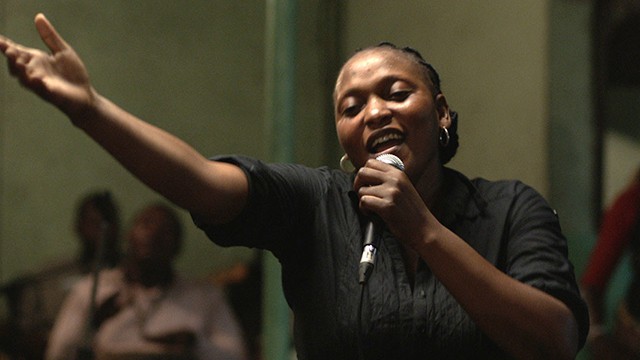inSauga Does TIFF: Félicité
Published September 21, 2017 at 3:34 am

While film festivals–particularly world-renowned ones like TIFF–are known for attracting big name celebrities, they’re also beloved for giving small films (often films about lives and subjects unfamiliar to western audiences) a chance to shine.
One such film that managed to generate positive buzz was Félicité, a film by French-Senegalese director Alain Gomis that explores the life and hard times of a Congolese nightclub singer whose life is derailed by her teenage’s son horrific (and costly) motorbike accident.
Set in Kinshasa, the capital city of Democratic Republic of the Congo (DRC), the film is beautifully shot and generally well-acted. At a public screening, Gomis reportedly said that his film is unique in the sense that it tells a story that never gets told. On that, he is correct.
Western audiences are rarely exposed to films about African people living and working regular lives in African countries. Félicité is a rare slice of life film that tells, without drama or a nervous or condescending or pretentious Hollywood touch, a story about a working class Congolese woman who pushes others away because she’s equal parts cranky and self-sufficient.
A film set in the DRC that’s not about war, horrific human rights abuses, corruption or savage and murderous gorillas is a rare gem indeed. It’s honestly refreshing to watch a human drama about Africa that doesn’t gawk at or dwell on misfortune in that “oh, those poor people, how sad!” kind of way.
I can see why critics praised this film.
Titular character Félicité (Véro Tshanda Beya) is a fiercely independent woman who ekes out a modest living as a popular singer at a local watering hole. A single mother raising her 14-year-old son, Samo (Gaetan Claudia), in a lower-income neighbourhood, prickly Félicité has few friends, no real family to speak of and a lukewarm friendship of sorts with handyman Tabu (Papi Mpaka), a nice guy by day and a belligerent drunk by night.
When Félicité learns that Samo has sustained a serious and potentially disabling injury in a motorbike crash, she has to rush against the clock to raise and collect money to fund her son’s expensive surgery.
The problem?
Her desperate search for help magnifies what the audience has known about the solemn singer all along–she doesn’t have many allies to lean on.
The film is at its best when Félicité is playfully bantering with Tabu–a loutish womanizer and loyal patron at her club who comes by every morning to help her fix her fridge (a cute running gag throughout the film)–and desperately hitting up everyone from estranged family members and her furious ex-husband to a wealthy man (who gives in to her demands after she makes a shrieking, hysterical spectacle of herself on his living room floor) for cash to help her son.
There are brilliant moments of dry humour in the film, including a standout scene in which one of Félicité’s co-workers tiredly beseeches others to donate money to her cause even though she’s basically the worst and everyone hates her (this is implied with his tone and carefully chosen words and certainly not said aloud).
The first hour or so is tight and engaging, a keenly focused human interest story centered around a flawed but intriguing woman who discovers she has no one to turn to when she’s most in need.
The second part of the film isn’t nearly as strong. Although the flick is bizarrely broken up by pleasant but ultimately distracting choir scenes throughout its run time, the narrative unravels significantly in the latter half. Rapidly shifting from a fascinating personal drama to an overlong exercise in arthouse pretentiousness, the story devolves and becomes, at times, unbearably unfocused.
It’s not that the story stops making sense, it’s simply lost to perplexing (and boring) scenes of aimless wandering, tortured staring and obnoxious drunken bar brawling. You keep rooting for Félicité and Tabu as they slowly connect, but it’s difficult to enjoy their journey when you’re constantly being pulled away by exhausting montages that add nothing to the story.
So, is Félicité worth seeing? Honestly, yes. Of all the films I saw at TIFF, I’ve probably discussed and dissected Félicité the most.
It’s just a shame that a solid first half is overshadowed by a long, irritating and needlessly surreal following act. If it were a stage play, I’d recommend leaving after intermission.
That said, it is–for the most part–a compelling African drama that is, at its core, universal and relatable.
It just needed a tighter script and meaner editor.
insauga's Editorial Standards and Policies advertising





